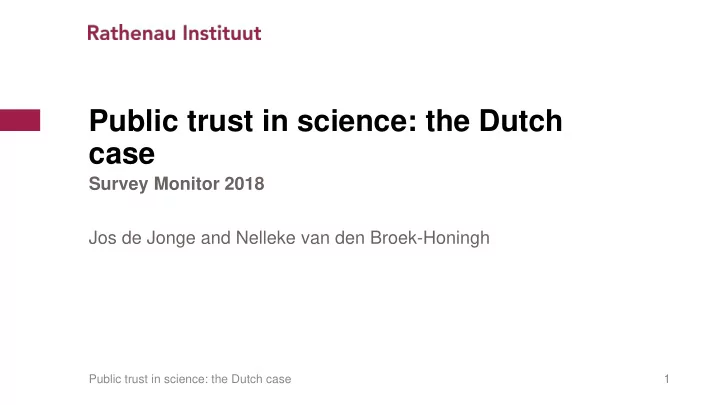

Public trust in science: the Dutch case Survey Monitor 2018 Jos de Jonge and Nelleke van den Broek-Honingh Public trust in science: the Dutch case 1
Content • About the Rathenau Instituut • Short history and methodology • Results: • Trust in science • How are scientists perceived? • Trust in cooperation? • Conclusions Public trust in science: the Dutch case 2
Rathenau Instituut • Founded in 1986 • Funded mostly by the Ministry of Education • Independant institute • Mission: stimulates public and political opinion forming on social aspects of science and technology. • We perform research and organize debate relating to science, innovation and new technologies. Public trust in science: the Dutch case 3
Short history and methodology • Incidents integrity of university professors • Broadly presented in the media • Academic world, journalists and politicians telling the same; as we all know trust in science is getting worse and worse • Is this true?; let’s investigate • Survey among the general public, over 800 respondents • Carefully represented in terms of age, cultural and economic background, gender, educational level, and urban/rural • Surveys held in 2012, 2015 and 2018 Public trust in science: the Dutch case 4
Trust in science in general Public trust in science: the Dutch case 5
Public trust in science: the Dutch case 6
Trust among different groups • Higher education -> higher trust • Lower education -> lower trust • No correlation with age and political preference • People with more knowledge of science on average higher trust • The same for people who come in contact with science Public trust in science: the Dutch case 7
Public trust in science: the Dutch case 8
Associations • Open question associate with ‘science’ • Most of their associations are either positive or neutral. • Mentioned most frequently are such words as study/studies, knowledge, progress and university. • The number of negative associations is small (below 2%). • Results are quite similar in 2012, 2015 and 2018 Public trust in science: the Dutch case 9
The public trust in science seems to remain (relatively) high and stable Vetenskap & Allmänhet, Barometer 2018/19 Wissenschaft im Dialog, science barometer 2018 Public trust in science: the Dutch case 10
Are scientists perceived as competent, reliable and honest? Public trust in science: the Dutch case 11
Are scientists perceived as competent? Public trust in science: the Dutch case 12
Are scientists perceived as reliable? Public trust in science: the Dutch case 13
Are scientists perceived as honest? Public trust in science: the Dutch case 14
Trust in cooperation between science and government/business? Public trust in science: the Dutch case 15
Trust in cooperation between science and government/business? Public trust in science: the Dutch case 16
Trust in cooperation between science and government/business? Public trust in science: the Dutch case 17
Public trust in science: the Dutch case 18
Conclusions • Trust in science is relatively high and stable • The majority of the Dutch think that scientists: • work very carefully • are experts in their field • are trustworthy even though they often disagree with each other • are objective and independent in their work • Views change as soon as scientists work for government or businesses • Most Dutch believe government and businesses • will only use research results when it supports their own ideas • and will try to obstruct unwanted results • Follow up research: focus groups Public trust in science: the Dutch case 19
Thank you for your attention! Questions? Contact information: n.vandenbroekhoningh@rathenau.nl Research report: https://www.rathenau.nl/en/knowledge-ecosystems/trust- science-netherlands Public trust in science: the Dutch case 20
Recommend
More recommend